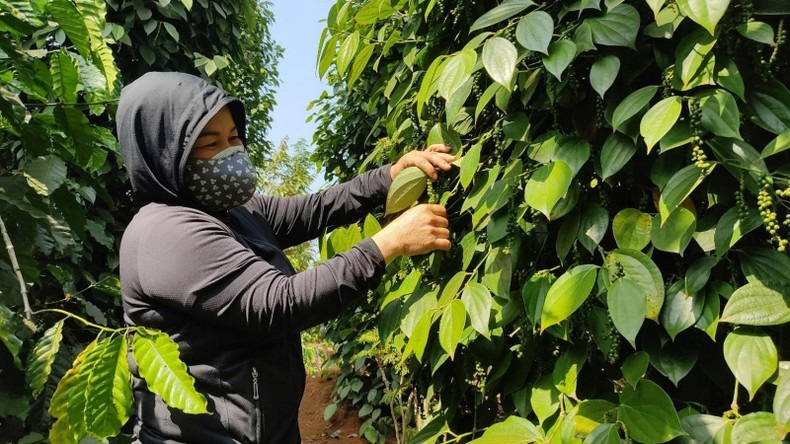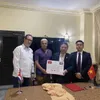Market expansion opportunities from new FTAs
New expectations
The difficulties in the world market have gradually affected the export of Vietnamese goods.
According to preliminary calculations of the Vietnam Textile and Apparel Association (Vitas), the total export turnover of Vietnam’s textiles and garments was estimated at 8.7 billion USD, in the first three months of 2023, down 18.63% over the same period in 2022. This is an unprecedented decrease, even during the difficult period due to the pandemic.
“The export of the textile and garment industry faced difficulties in the first three months of this year. Orders of enterprises fell sharply by 30-40%. Importers in most markets are very cautious when placing new orders,” said Pham Xuan Hong, Chairman of the Ho Chi Minh City Association of Garment, Textile, Embroidery and Knitting.
The difficulty of the textile and garment industry is the general difficulty of export activities in recent times. After a year since Russia launched a military campaign in Ukraine, the conflict situation has not cooled down, even showing signs of increasing tension. This has led to a decline in world economic growth, leading to tight monetary policies, causing negative impacts on the activities of manufacturing and exporting enterprises. In addition, non-trade barriers are established by countries everywhere, creating great difficulties for export activities.
In that context, the completion of the Vietnam-Israel FTA and the start of negotiations for a Vietnam-UAE FTA, are of special significance, helping exporters have more opportunities to expand the market.
Although Israel and the UAE are not big markets, opening up a market has special meaning for businesses, in such a difficult context. In addition, the potential of these markets is quite large, reflected in the growth of goods in these markets.
For example, the two-way trade exchange between Vietnam and Israel was constantly increasing from 1.58 billion USD in 2020 to 1.89 billion USD in 2021 and reaching 2.23 billion USD in 2022, an increase of 17.85% over the previous year.
Israel is currently the 5th largest trading partner and the 3rd largest export market of Vietnam in the Middle East (after the UAE and Turkey).
According to Truong Xuan Trung, First Secretary, in charge of the Vietnam Trade Office in the UAE, Vietnam’s export turnover to the UAE only reached 140 million USD in 2006 but soared to 3.85 billion USD in 2022. Resulting in Vietnam enjoying a trade surplus of 3.27 billion USD.
Particularly, in the first three months of 2023, the total bilateral trade turnover between Vietnam and the UAE was estimated at over 1.12 billion USD, a sharp increase of 22.14% over the same period in 2022.
General Secretary of the Vietnam Association of Seafood Exporters and Producers Truong Dinh Hoe said, that Israel is in the top 22 seafood export markets of Vietnam. Exports through this market include shrimp, frozen squid, canned tuna, tra fish and others.
Tuna exports to Israel reached 36.63 million USD in 2022 and Israel ranks 4th among the 10 largest tuna import markets of Vietnam (after the US, Canada and Japan). Frozen squid exports to this market also posted at 23.22 million USD in 2022, accounting for 1.7% of Vietnam’s exports of this item and Israel ranked 8th among the top 10 import markets of Vietnam’s squid and octopus. Frozen shrimp exports to Israel reached about 21 million USD and Israel ranked 20th in the top import markets of Vietnamese frozen shrimp.
“Vietnamese seafood products in Israel now have a stable foothold and are favoured and appreciated by this country’s consumers,” said Hoe.
According to the Director of Tri Viet Agricultural Food Trading Production Company Nguyen Huu Tri, UAE is a large market, equivalent to the US market. The UAE has about 12 countries with a total population of about 700 million people. The UAE depends on agriculture in other countries and regions. It is also a market with large purchasing power and high financial capacity. Tri noted that the UAE is one of the three main markets in his company’s development orientation.
Opportunity is only for businesses with good preparation
With market standards not as strict as the US and the EU, new FTAs such as the Vietnam-Israel FTA and the Vietnam-UAE FTA will be an opportunity to bring Vietnamese agricultural products in general and Vietnamese spices, in particular, to penetrate the Middle East market, according to Vice Chairwoman of the Vietnam Agricultural Business Council (VCAC) and Chairwoman of the Board of Directors of Vietnam Organic Nutrition Food JSC, Nguyen Thi Diem Hang.

Enterprises must meet food hygiene and safety standards.
“However, every market has its regulations. Businesses also need to determine that they must meet the standards of importers. Vietnam is considered the world’s factory, therefore, businesses should remain ready and produce products meeting FDA, HACCP, and ISO standards, as well as other food hygiene and safety standards of Vietnam and the markets that we aim at,” Hang emphasised
FTAs will bring opportunities for all businesses. Accordingly, the opportunity will be for businesses that have built a standard system, to meet demanding markets such as the UAE. Businesses that have not met many standards can enter niche markets like Bangladesh and Pakistan.
Truong Xuan Trung affirmed that to further promote the export of Vietnamese goods to the UAE, Vietnamese enterprises need to apply advanced science and technology in production, change the management method, and minimise intermediary costs, to increase the competitiveness of Vietnamese products.
In addition, the UAE is an Islamic country, so Vietnamese businesses need to learn about Muslim culture and build a Halal certification system, for products to be exported to the UAE.
“When the Vietnam-UAE FTA is signed, the trade and investment relationship between the two countries is expected to continue to grow stronger. The UAE is considered the financial and trade centre of the Middle East, an important gateway to bringing Vietnamese goods to the Middle East, Africa and Europe. In addition, the UAE has a strategic geographical position and a modern logistics system that will create favourable conditions for Vietnamese goods to access and expand to the global market,” Trung said.
Tags:





